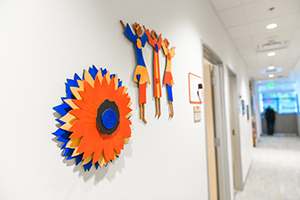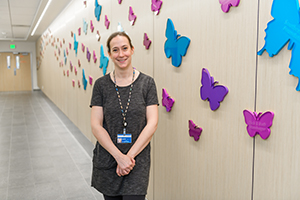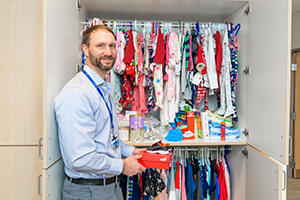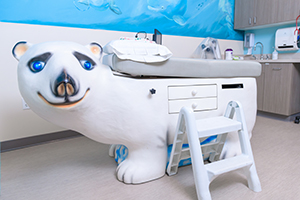By LISA EISENHAUER
June 10, 2020
When someone reports maltreatment of a child in the greater Anchorage area, Alaska CARES is at the ready to help coordinate a response that is both compassionate and culturally sensitive.

Vibrant art brightens the halls, offices and waiting rooms at Alaska CARES. Some of it depicts the state's wildlife and landscapes. Many of the art works were done by local artists. Photo credit: Stephanie Cook
CARES is an acronym for Child Abuse Response & Evaluation Services. The program sponsored by Providence Health & Services Alaska and coordinated through The Children's Hospital at Providence in Anchorage provides treatment in a facility where several organizations use their separate expertise to assess, plan and manage the care for victims and the law enforcement response and where a variety of resources are readily available.
"All the different agencies that are in the building are purposefully here because we are all working together to support children and families," says Jessica Nichols, Alaska CARES' assistant manager. For its innovative, collaborative approach to helping ease the suffering for young victims of maltreatment and their families by streamlining the care and investigation process, Alaska CARES is the 2020 recipient of CHA's highest annual honor — the Achievement Citation. The award presentation will take place at the Catholic Health Assembly in Indianapolis in 2021. (The 2020 annual assembly was held virtually June 8 because of the coronavirus pandemic.)

Jessica Nichols, Alaska CARES' assistant manager, stands next to the butterfly wall at the facility in Anchorage, Alaska. The wall was inspired by a 4-year-old who was a patient in the program, which helps children recover from physical and sexual abuse. While in therapy, the child said: "I hope my caterpillars turn into butterflies." Photo credit: Stephanie Cook
Culturally appropriate response
At the Alaska CARES facility, children who suffer any type of maltreatment, including sexual and physical abuse and intimidation, undergo medical, mental and forensic assessments and examinations by professionals trained to work with young victims. After the initial evaluations, the victims and their families can be referred for care or assistance to counselors and social service programs, some of which have offices in the same facility as Alaska CARES.
Among the advantages of having the various organizations under one roof is that forensic interviews of the victims can be done by one person with input from representatives of the other organizations who are in separate monitoring rooms. That process avoids the need for victims to repeatedly relive their trauma through duplicate interviews for criminal complaints and child welfare agencies.

Bryant Skinner, director of Alaska CARES, displays a toddler's shoe from a kid's closet at Alaska CARES. Sponsored by Providence Health & Services Alaska, the program helps abused children and their families recover from their trauma.
In addition to coordinating its efforts with state and local law enforcement and with Alaska's Office of Children's Services, Alaska CARES works with and gets support from the Southcentral Foundation, a nonprofit health care and social welfare organization that is run and funded by native Alaskans. The foundation has an advocacy team based at the Alaska CARES facility.
"They're there to get those families into appropriate services," Bryant Skinner, Alaska CARES' director, says of the Southcentral Foundation advocacy team. "They have access to services that we would not have access to, so having them here working with those families is extremely important."
High rate of dysfunction
Alaska is among states with the highest rate of child maltreatment in the nation. A report released in January by the U.S. Department of Health & Human Services put the rate of child victims of maltreatment in Alaska at 14.2 per 1,000 in 2018. Nationwide, the rate was 9.2. Alaska CARES assists about 1,000 patients from newborn to age 18 every year.

A polar bear pediatric exam table is one of the many child-friendly features intended to make patients feel safe at Alaska CARES. Professionals trained to work with young abuse victims provide medical, mental and forensic assessments as well as therapy at the facility.
"Since it was founded in 1996, Alaska CARES has helped approximately 21,000 children escape from abuse and begin more positive and productive lives," Providence says in narrative nominating the program for the Achievement Citation.
Cathy Baldwin-Johnson, former medical director of Alaska CARES, says the high rate of child maltreatment is fueled by significant rates of substance and domestic abuse, historical trauma, and social isolation in the nation's largest and largely rural state.
"We also have a number of people, for example, who come up and do seasonal work or who come up through the military, and often when people move here to Alaska for whatever reason, they don't have extended family with them," Baldwin-Johnson says.
Child-friendly facility
In the spring of last year, Alaska Cares moved into a new facility specifically designed for the services it and its collaborators provide. Among the child- and family-friendly features in its offices are private waiting rooms so families in crisis can have their privacy. Colorful murals and other wall art provide a playful touch to put young patients at ease.
Providence provided a $12.8 million initial capital investment for the facility, much of that raised through a capital campaign led by the Providence Alaska Foundation. Community partners and donors helped raise more.
Most of the program's annual operating budget of $2.3 million also comes from Providence, as part of the health system's community benefit effort. "It's a mission-driven program in terms of serving the poor and vulnerable in our community and statewide," Skinner says.
Skinner and Nichols are among the program's 23 full- and part-time staff members, who include administrators, doctors, advanced nurse practitioners, forensic interviewers, forensic nurses and family advocates.
Alaska CARES is accredited by the National Children's Alliance as one of 881 child advocacy centers nationwide and one of 13 in Alaska. To be accredited, the nonprofit alliance requires a program to follow its model and set up a "child-friendly facility in which law enforcement, child protection, prosecution, mental health, medical and victim advocacy professionals work together to investigate abuse, help children heal from abuse, and hold offenders accountable."
Easing the way
Baldwin-Johnson says the child advocacy center model pairs well with Providence's efforts to smooth the way from treatment through recovery for patients. For young abuse victims and their families, that can mean helping them through the child protection process and the legal process and connecting them with follow-up medical and mental health resources.
"I think all of this really follows that easing-the-way model," Baldwin-Johnson says. "And really this facility is designed for that and the staff is highly trained to do that."
The strategies used in extended care for clients include art therapy and pet therapy from a dog named Kiska, who helps put some children at ease.
From anger to peace
A story Providence uses to highlight Alaska CARES services to the greater Anchorage community is about a patient named Kimi, who started therapy in the program when she was 8 after being sexually abused by a neighbor along with a younger sister. The girl was able to escape from the room where the neighbor was abusing them, but her younger sister couldn't get away. The older girl told someone what had happened, and the abuser faced criminal prosecution.
One of the girl's first drawings was a tight red ball of scribbles that she described with the words "anger, hurt, sad, guilt, nervous, scared." After a year of therapy, she drew a painting with three animals, one much smaller than the others, on a background with a sky, grass and a sliver of sun. She called it "Peace."
In nominating Alaska CARES for the Achievement Citation, Providence says that by giving Kimi and other traumatized children the tools, guidance and support they needed to navigate their way through many complicated emotions, "Alaska CARES changed the trajectory of their lives."
Nichols adds, "When kids are seen here and they've been able to go through the process — the forensic interview, medical exam — sometimes they will look a little different, they'll stand a little taller, talk a little different, just because they've been able to share their story of what happened to them and they're not carrying that burden on them anymore," she says.